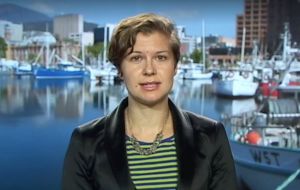MercoPress. South Atlantic News Agency
CCAMLR fails to protect Southern Ocean
 Conservation is the principal objective of CCAMLR, ”yet it has consistently failed to fulfill its commitment to the protection of Antarctic marine living resources.”
Conservation is the principal objective of CCAMLR, ”yet it has consistently failed to fulfill its commitment to the protection of Antarctic marine living resources.”  “Unfortunately we are in the same place as we were last year...,” said Claire Christian, Executive Director of the Antarctic and Southern Coalition (ASOC)
“Unfortunately we are in the same place as we were last year...,” said Claire Christian, Executive Director of the Antarctic and Southern Coalition (ASOC) The Commission for the Conservation of Antarctic Marine Living Resources (CCAMLR) has again failed to take action to protect the Southern Ocean, with no progress made on the critical issues of marine protected areas, climate change, and transshipment.
“Unfortunately we are in the same place as we were last year, having reached the end of yet another meeting without progress on CCAMLR’s commitment to establish a network of marine protected areas,” said Claire Christian, Executive Director of the Antarctic and Southern Coalition (ASOC).
“We are now deeply worried about the future of the Commission and its credibility. Conservation is the principal objective of CCAMLR, yet it has consistently failed to fulfill its commitment to the protection of Antarctic marine living resources.”
CCAMLR was not able to agree on a proposal put forward by Australia, the EU and France for an MPA in East Antarctica for the seventh year in a row, after failing to gain the required consensus. This is despite the proposal being based on the best available science and good-faith attempts by supportive delegations.
A proposal to protect the Weddell Sea put forward by the EU and Germany also failed to reach consensus, after a proponent only accepted the Western portion of the proposal and claimed that a wider area needed to be considered for the Eastern part, despite making no commitment in terms of timing, contribution, or engagement in further analysis.
“2018 offered the Commission a historic opportunity to create the largest protected area on Earth in the Weddell Sea, backed by 22 of 25 of its members at the meeting, and nearly three million people worldwide. Instead, it allowed three countries to undermine negotiations,” said Frida Bengtsson of Greenpeace’s Protect the Antarctic campaign.
“Something needs to change if the Commission is to properly carry out its mandate in years to come. Given the scale of the threats facing our oceans, we are quickly running out of time.”
A third MPA proposal was submitted to CCAMLR this year by Argentina and Chile, outlining a marine protected area in the Antarctic Peninsula. The proposal has been developed collaboratively and was received well, gaining support from most Members.
“An MPA off the Antarctic Peninsula would protect critical habitats for iconic species including penguins, whales, seals, seabirds, and Antarctic krill — a keystone species in the Southern Ocean food web,” said Chris Johnson, Senior Manager for WWF’s Antarctic Program.
“Although it did not progress this year, we are hopeful that the proposal will move forward, particularly given that it comes in the same week that WWF’s flagship Living Planet Report highlighted the concerning impacts climate change is having on penguin species around the Peninsula and in Antarctica generally. We’re in a race against time to protect these waters before it’s too late, and the Commission needs to step up.”
CCAMLR was not able to pass a measure introduced by the U.S. to improve the way in which fish are transferred from fishing vessels to carrier vessels. This process can be used to conceal illegal, unregulated, and unreported (IUU) fishing and the proposal would strengthen the management of the process to bring it in line with international regional fisheries management organizations (RFMOs).
“We’re very disappointed that CCAMLR did not make even basic revisions this year to its transshipment protocol—something that is much needed in the global fight against illegal, unreported, and unregulated fishing. CCAMLR’s requirements lag far behind the stronger measures that have become standard practice in other ocean management bodies, including RMFOs around the world. CCAMLR needs to get this serious gap in IUU fishing under control.” said Andrea Kavanagh, director of The Pew Charitable Trusts Antarctic and Southern Ocean work.
“CCAMLR must honor its responsibility to protect the Southern Ocean by heeding scientific evidence and by closing the transshipment loopholes for IUU fishers and designating additional MPAs, including in East Antarctica, the Weddell Sea, and the Antarctic Peninsula, before it’s too late to save one of the Earth’s last remaining wildernesses.” Kavanagh added.
Progress was also prevented on an important work plan to determine the role CCAMLR should play in managing the impacts of climate change, despite the clear impacts on Antarctic marine ecosystems.
ASOC, The Antarctic and Southern Ocean Coalition is made up of 17 non-governmental organizations working to preserve Antarctica and the surrounding Southern Ocean. Our vision is for CCAMLR to designate a network of marine protected areas (MPAs) in the Southern Ocean by 2020.
The Commission for the Conservation of Antarctic Marine Living Resources (also known as CCAMLR) is made up of 24 counties and the European Union. It committed in 2009 to establish a network of large-scale marine protected areas throughout the Southern Ocean by 2012.
ASOC participates in CCAMLR as an observer. Although we cannot participate in decision making, we represent the positions of the environmental community. We do this by submitting papers encouraging decision makers to pursue outcomes that conserve and protect the Southern Ocean, by meeting with CCAMLR Members during the meeting and throughout the year, and by raising public awareness about Antarctic marine conservation. (ASOC).




Top Comments
Disclaimer & comment rulesCommenting for this story is now closed.
If you have a Facebook account, become a fan and comment on our Facebook Page!